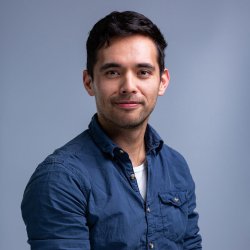Commercialisation Fellow Spotlight - Michael Short
This year we thought it would be interesting to hear some early first-hand insights into the IAA Commercialisation Fellowship programme and the relationship between Research and Innovation, directly from the Fellows themselves.
Calling Surrey ECRs!
We are OPEN to receive expressions of interest and applications from ECRs based in all faculties for the new 2022 Cohort! Email your questions, interest, and applications to iaa@surrey.ac.uk.
- Are you one of our Surrey ECRs?
- Are you becoming interested in innovation?
- Are you interested in what the Commercialisation Fellowship can offer you and how it could boost your outputs?
If you said yes to these, then perhaps this is the right opportunity for you. Contact us at iaa@surrey.ac.uk with ANY questions, and apply to our Summer 2022 Cohort (April – September)!
... and now let's hear from Michael.
Tell us about yourself, why you applied for this fellowship, and what you expect to gain
I am an international academic (having worked in South Africa and the US) and fairly new to the UK. One of the main reasons that I sought the fellowship was to increase my understanding of the UK innovation landscape and expand my academic and industrial networks both within the University and across the UK.
As an academic that focuses on software for engineering applications, I have become more aware of the importance of impact and commercial potential for software and algorithms through my interactions with industrial partners (who have commercial software products) on recent grant proposals and through my Co-I role on a recent Collaborate21 Award. With the UKRI and EPSRC, in particular, putting significant focus on commercialisation potential and impact, I wanted to increase my awareness and understanding of this to take advantage of potential innovations within my group, and also increase my success rate in applying for research funding through these schemes.
Typically, we are releasing our research codes on public, open-source code-sharing sites, however, I wanted more experience and time to explore how to potentially commercialise these innovations. I had very little experience in managing and learning about intellectual property and I felt this would be valuable, particularly as a PI.
Apart from this, I also wanted to give my research group and students whom I work with on a day-to-day basis more awareness and support in encouraging innovation and impact via commercialisation. I want my students to think about the bigger picture behind their work, which is often theoretical.
As a young PI, with a relatively small team at the moment, this was an ideal time for me to explore this opportunity before I am too encumbered by other responsibilities that may come as a result of an expanded team of PhD students and PDRAs, in addition to increasing administrative loads.
I originally hoped to gain the following from this fellowship:
- Gain experience and understanding of the UK innovation environment
- Learn more about software intellectual property and explore the potential for commercialisation of my own group’s research
- Increase my industrial and academic network, both within the University and in the UK more broadly
- Learn how colleagues within the University work towards identifying and taking advantage of commercialisation opportunities and understand how I might encourage students and colleagues to do the same
How would you define ‘innovation’, how does it fit within an academic environment, and how is it relevant?
Before beginning my Commercialisation Fellowship, I probably would have defined innovation as simply being curious and trying new things to ultimately come up with new ideas, processes, materials, products, etc. A month into the Fellowship, I can certainly see that novelty alone is not what defines innovation. While novelty is still a core part of innovation, successful innovation should include strong motivations, such as benefiting society, and that the pathway to impact is a part of innovation itself. A novel idea alone is not enough. Innovation, therefore, should be at the core of university life, in both teaching and research.
What do you think are the biggest barriers to innovation for researchers at Surrey, in particular within your Dpt or Faculty, and how do you suggest we address these?
I think that if you ask any academic, that they would certainly say that they are innovating. However, when the discussion turns into how we can translate these innovations into impact for society, this is possibly where the conversation begins to break down. It is difficult for many academics to imagine the long-term implications of their many projects during day-to-day teaching and research, particularly when academics are so pressed for time. Time is always the largest barrier. We need to educate researchers on the various pathways, funding schemes, and collaboration opportunities that exist, convince them that the additional forms and administrative processes will be worth their time, and to give them the mental space to think long-term about the best ways to use their skills and research for the public good. Unfortunately, this usually requires more funding for training, fellowships, sabbaticals, etc.
What are you plans over the next 12-18 months and how might this fellowship support those plans?
Over the next 12-18 months, I anticipate my research group to grow with several PhD students joining. I have already learnt new techniques from the Innovation team at Surrey and the Start-up mentality on how to manage projects and foster collaboration and innovation within my group. I hope that my experiences as a Comms Fellow will help me to be a better mentor for my team and to encourage innovation and impact from their ideas. I am hoping to apply for several funding opportunities from the UKRI, and the opportunity to work with colleagues in the Innovation team has provided me with additional internal and external collaborators to build strong research teams for my proposals. The fellowship has already helped put me in touch with 2 companies that have an interest in my work (a multinational and SME). Additionally, I will reconsider my workflows for publication to explore additional commercial opportunities from my work, whether that is as a consultant, or through creating bespoke software solutions, rather than releasing everything as open-source code. I am especially looking forward to exploring the potential of the software and algorithms being developed in my group for commercialisation.
How has the start of your fellowship begun? Who have you met, what projects are you involved with, and what things have you already learned? – was anything unexpected? Did reality meet your expectations?
The transition into the fellowship has been great. We have been given a lot of freedom to explore but have also been given enough structure and content to get us started. The Innovation landscape at Surrey is large and complex, with many teams across the university, and so it was quite overwhelming at first to get familiar with all the various functions. I was quite surprised by the breadth of work that the team does, from managing IP (Intellectual Property), collaborations, Start-up funding, training, etc. I have a far clearer understanding of all the different funding streams within the university, IP, and how collaborations and start-ups work.
Thus far, I have mostly been working alone to orient myself with the landscape and partaking in training and webinars, however, I am becoming more involved in different projects from this month. Most rewarding thus far has been my interactions with Dr Andrew Rogoyski, looking to initiate research relationships with two potential industrial partners. I am looking forward to helping Faraz Rizvi with preparing case studies for the IAA, giving me the opportunity to view previously funded projects and interview academics from across the university. This will provide me with insights into how to obtain funding, what makes a project successful, and to build my internal network. I am also especially looking forward to discussions with Dr Will Lovegrove to learn more about software innovation, and how to balance open research practices with impact and commercialisation potential.
I would say that my expectations thus far have certainly been met and exceeded. I wish that I could have committed to more time!
If so, how has the fellowship changed your approach to innovation? What are your expectations for the rest of the fellowship e.g. things you’re looking forward to?
I mentioned in my answer above that my approach has shifted more towards the impact and benefit of my innovation, rather than simply novelty. I had never given thought to the fact that commercialisation is sometimes the best path to impact, rather believing that simply sharing the ideas and making them public was enough. I am looking forward to many things in the fellowship. Particularly exciting is working with new industrial collaborators, and spending time to think about and formulate pathways to greater impact from my own research. Additionally, I look forward to engaging with the Innovation team and learning more about the internal processes within the university for IP protection, spinout companies, and the various funding opportunities that my future research and colleagues in my department might be able to benefit from.
What would you say to a prospective ECR considering applying to the fellowship?
I would highly recommend the fellowship, particularly to ECRs. This experience has really helped me to see the other side of the university. Usually, as a researcher the focus is on publication, and we all know that many publications go largely unnoticed. Innovation at Surrey helps to, firstly, explain a complex funding landscape, as well as to make the seemingly complex world of IP, business, and legal agreement understandable.
The opportunity has also put me in touch with many colleagues from across the university that I would have been unlikely to meet but have shared interests. I have also been able to meet potential industrial partners and have been given the space to think about the potential of my own research for impact, whether that be through commercialisation, open-source software release, or consulting.
As an ECR, this is likely to be the time when you have more time (although it may not seem like it), so it is the perfect time to get involved as it can influence your thinking and research direction in the future.
Survey
Question | 😱 | 😵💫 | 😐 | 🤓 | 🔥 |
|---|---|---|---|---|---|
Before your Fellowship, what was your practical understanding and application of impact, knowledge exchange and commercialisation activities? |
| ✅ |
|
|
|
Before your Fellowship, what was your understanding of IP? |
| ✅ |
|
|
|
Before your Fellowship, what was your awareness for the relevance of innovation to the academic career? |
|
| ✅ |
|
|
Before your Fellowship, how confident were you to approach industry with a commercial opportunity and to manage that relationship? |
|
|
| ✅ |
|
Before your Fellowship, what was your awareness of the Innovation Strategy teams and their functions? |
| ✅ |
|
|
|
Overall, how do you feel about Innovation now? |
|
|
| ✅ |
|


